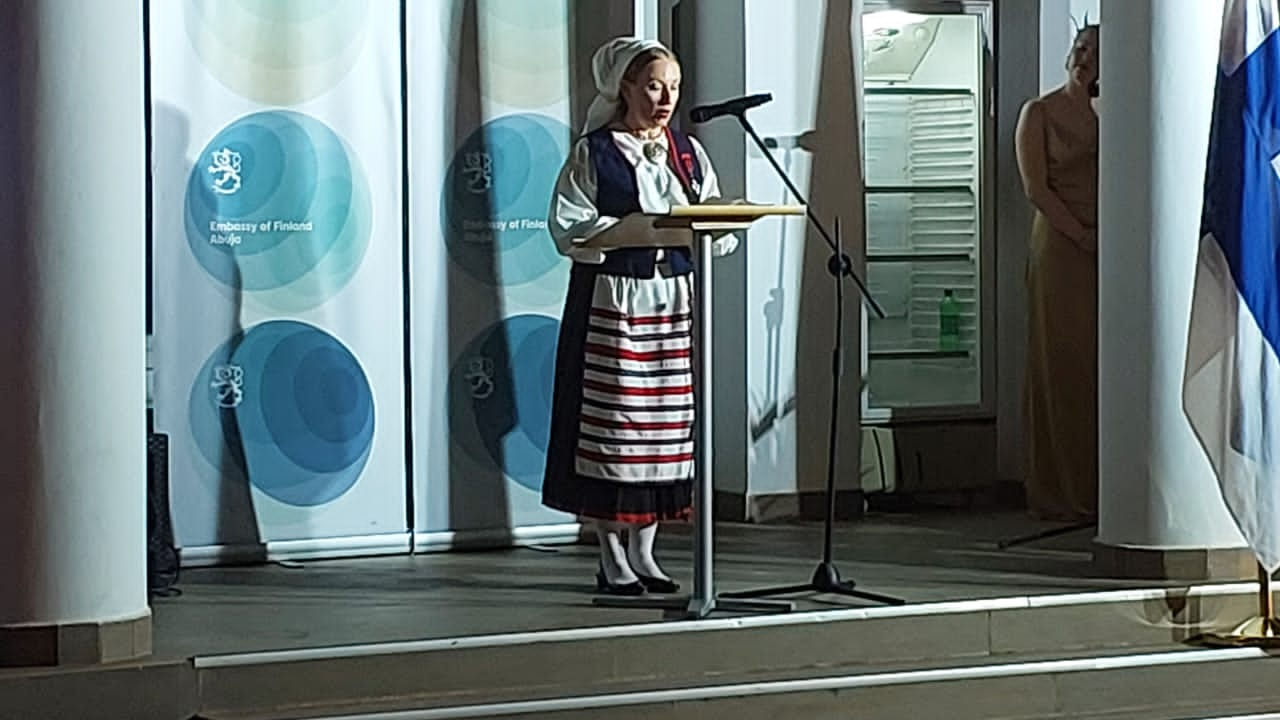Foreign news
Finland-Nigeria future cooperation has a brighter prospect-envoy

Mrs Sanna Selin, the new Finnish Ambassador to Nigeria, says Nigeria and Finland have a brighter future together through bilateral relations.
The envoy said this during her Finland’s 107 years National Day celebration, which was held on Wednesday night in Abuja.
She said that to promote stronger cooperation, both countries needed to learn from each other to build trust
.
According to Selin, the fact that Nigeria and Finland differ in many ways has not and will not prevent both nations from together finding mutual and beneficial solutions to shared challenges.
“The key is to better understand each other and each others’ needs by working tirelessly together to learn from one another and build trust.
“Nigeria and Finland share many common values. We work closely together in multilateral fora for a better world.
“As an Ambassador of Finland to Nigeria, I see our future brighter together”, she said.
Speaking on the Ukraine-Russian war, she said that the long-term aim for the Finnish Foreign Policy had been to promote peace, security, and sustainable development.
She said that for Finland, it was self-evident that supporting Ukraine is the obligation at the current war.
“My grandparents were the generation fighting for the independence and sovereignty of Finland. I am deeply grateful for their sacrifice.
“Ukraine is fighting, not only for its survival, but also defending the rules-based international order.
“From our own historical experience and fight for independence, we know what Ukraine is going through”, she said.
According to Selin, before independence from the Russian empire, all Finnish men and women gained full political rights to be voted and elected.
She said women used their political influence to demand for better school and healthcare for the Finnish people.
“Since 2018, the World Happiness Report has ranked Finland as the happiest country in the world.
“Relevant factors contributing to happiness seem to be Finland’s social safety net combined with personal freedom and a good work-life balance,’” she said.
NAN
Foreign news
Pakistan Moves to Deepen Diplomatic, Economic Relations With Nigeria

The Government of the Islamic Republic of Pakistan has called for deeper diplomatic and economic ties with the Nigerian government to foster development for both countries.
Mr Rana Ihsaan, the Coordinator to the Prime Minister of Pakistan made the call in an interview with the News Agency of Nigeria (NAN) during his working vist to Nigeria on Wednesday in Abuja.
NAN reports that the visiting Coordinator held a closed-door meeting with Yusuf Tuggar, the Minister of Foreign Affairs.
After the meeting, he said that both both sides had agreed on deepening relations in the areas of trade and commerce, among others.
Ihsaan said that both countries must see the need to accelerate efforts towards a Bilateral Trade Agreement (BTA).
He said that Pakistan had already submitted a draft BTA and was awaiting Nigeria’s response.
According to him, discussions centered on easing visa processes, expanding educational exchanges, and strengthening Cooperation in sectors such as Minerals, Youth training, and Defence were highlighted.
Ihsaan said that Pakistan had already implemented visa-on-arrival for Nigerians at no cost, and urged Nigeria to reciprocate to enhance people-to-people ties.
He stressed the importance of high-level engagements between both nations, describing Nigeria and Pakistan as very similar countries with large populations, youthful demographics, and vast economic potentials.
“Deeper collaboration will unlock opportunities in trade, education and investment, while further solidifying long-standing diplomatic relations,” he said.
He said that aside from visiting the foriegn Minister and other top government officials in Nigeria, he was also in the country to attend the on-going West Africa Beauty Exhibition holding in Lagos.
He described the exhibition as one of the continent’s largest cosmetic fairs, adding that he led a delegation of 19 Pakistani business people exploring Nigeria’s estimated 10 million dollar beauty and cosmetics market.
Ihsaan said that Nigeria was a gateway to Africa, adding that Pakistani products, like cosmetics, Textiles, Pharmaceuticals, Food items and Sports goods were already gaining traction in the country.
He encouraged Pakistani exhibitors to establish offices, Warehouses and logistics partnerships to strengthen their foothold in the Nigerian market.
Ihsaan further addressed concerns from Nigerian businesses on the ease of doing business in Pakistan.
He said that the Trade Development Authority of Pakistan had been supporting Nigerian participants at major exhibitions to achieve the ease of doing business.
“The Special Investment Facilitation Council (SIFC) serves as a one-stop platform for Nigerians interested in investing in Pakistan,” he said
Culled from NAN
-

 Featured6 years ago
Featured6 years agoLampard Names New Chelsea Manager
-

 Featured6 years ago
Featured6 years agoFG To Extends Lockdown In FCT, Lagos Ogun states For 7days
-

 Featured6 years ago
Featured6 years agoChildren Custody: Court Adjourns Mike Ezuruonye, Wife’s Case To April 7
-

 Featured6 years ago
Featured6 years agoNYSC Dismisses Report Of DG’s Plan To Islamize Benue Orientation Camp
-

 Featured4 years ago
Featured4 years agoTransfer Saga: How Mikel Obi Refused to compensate me After I Linked Him Worth $4m Deal In Kuwait SC – Okafor
-
Sports3 years ago
TINUBU LAMBAST DELE MOMODU
-

 News11 months ago
News11 months agoZulu to Super Eagles B team, President Tinubu is happy with you
-
Featured6 years ago
Board urges FG to establish one-stop rehabilitation centres in 6 geopolitical zones
